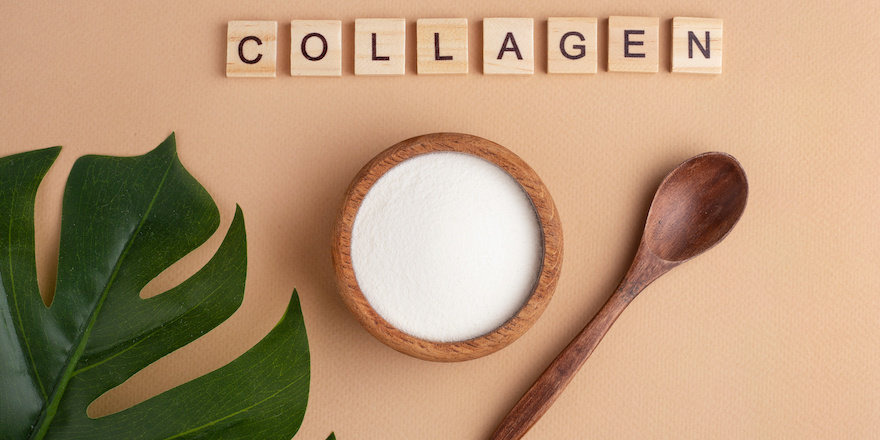Before it reaches nutrition shelves, collagen is a protein naturally produced by the human body. Bones, tendons, joints, muscles, skin: the majority of our tissues contain it. Nothing more natural!
Its role? To contribute to joint comfort, keep skin resilient and toned, maintain healthy blood vessels, etc. In short, collagen is essential.
And if in recent years this molecule has appeared in the form of capsules, drinks, or powder, it’s not without reason. From our 20s, the body’s production gradually slows down. This results in the appearance of wrinkles and joint pain over the years.
Dans les boutiques de compléments alimentaires, sur les réseaux sociaux, je vois que les collagènes bovins, marins, et même porcins se démocratisent. Pas très végétalien, tout ça ! Pour répondre à la demande et à tous les régimes, du collagène végan s’implante aux côtés des autres compléments.
Read also | The best marine collagen according to a pharmacist
What ‘vegan collagen’ means
A marketing label
How can a protein that is normally animal end up inside plants? No need to keep the suspense until the end: No, vegan collagen does not exist.
This molecule is useful only in the animal kingdom. Plants don’t need it to develop and function properly. They have molecules specific to their kingdom. But not collagen!
So why do products list this term on their packaging? It’s a purely marketing label.
I took a closer look at dietary supplements, as well as cosmetics labeled “vegan collagen”: there are subtleties noted within the product information.
So we distinguish two types of supplements.
Collagen boosters
These are a set of plants and ingredients that provide nutrients that are precursors to collagen synthesis. They help promote its production.
If you take the example of a car, gasoline boosts it so it can run. It’s the same here!
The ‘plant-based collagens’
This is the term that causes the most confusion, giving the initial impression that plant collagen exists.
In reality, it is a blend of plants containing certain amino acids found in regular collagen, namely glycine, proline, and hydroxyproline.
Mais ce n’est pas parce que ces plantes apportent une partie des acides aminés, qu’il est possible de reconstituer la molécule de collagène. En revanche, ces acides aminés peuvent tout de même participer à la production endogène de la protéine, comme l’indique cette étude que j’ai trouvée sur le sujet.
Certains actifs brevetés, comme le Coll-egan®, combinent les deux méthodes : riches en acides aminés, ils ajoutent également de la vitamine C dans leur complexe pour favoriser la production de la protéine.

Comment apporter du collagène à l’organisme si vous êtes végan·e ?
Don’t panic! You can be vegan and try to give your body a little help so that it produces collagen naturally.
En dehors des compléments, quelques gestes alimentaires sont susceptibles de favoriser votre synthèse :
- enrich your plate with antioxidants to fight collagen degradation
- add vitamin C to boost its synthesis
- eat enough protein to provide the body with amino acids



